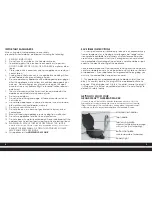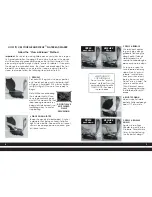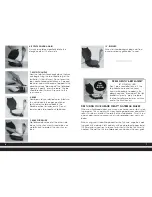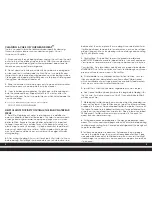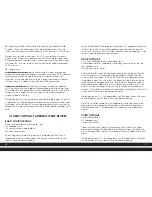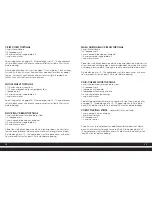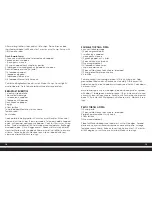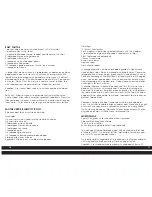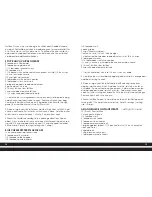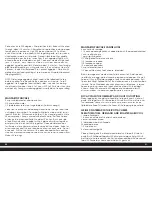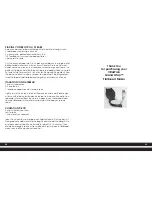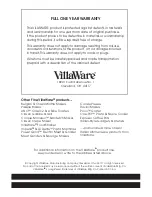
9
8
balls and set them on a plate. Be sure dough is covered at all times.
It will keep at room temperature for several hours, or may be refriger-
ated as long as 36 hours by greasing surface of dough and covering
tightly with plastic wrap.
3.
Flour tortillas
: It is important to press the grand wrap lid down
quickly with moderate pressure (approximately 1 second) and open.
Press lid down several more times to achieve desired size & thickness.
Corn tortillas:
Press lever down quickly only once, open lid and bake
as directed. Due to the consistency of corn tortilla dough, continuous
pressure will cause some cracks in the tortilla.
4.
It is preferable to use unbleached flour for flour tortillas. Corn tor-
tillas are made from dehydrated masa flour called “Masa Harina”
which is available at most supermarkets and specialty food markets.
Corn meal is not a substitute for Masa Harina.
5.
Low fat hint:
Substitue canola or vegetable oil in most recipes.
6.
Don’t leave tortilla on baking surface too long before flipping it for
the first time; it will dry out and won’t puff. If you over bake tortilla it
will become crisp.
7.
While baking tortillas, keep them warm and moist by wrapping in a
heavy cotton towel. Stack tortillas one on top of the other and keep
wrapped in the towel. Place wrapped tortillas in a basket to serve at
the table. To keep freshly baked tortillas warm for an extended time,
wrap them in a towel and then wrap in foil. Place in low oven (about
200 degrees). Tortillas will remain warm and moist in the oven for
about one hour before serving.
8.
Timing and advanced preparation: The dough preparation takes
about 15 minutes, and should begin at least 45 minutes before baking
to allow dough resting time. Covered and refrigerated, the dough will
keep for several days.
9.
Tortillas can be baked in advance. Refrigerate them wrapped
securely in a plastic bag. You may also freeze baked tortillas. Place
wax paper between each tortilla and wrap them securely in airtight
freezer bags. They defrost very quickly, and with proper care, taste as
if just baked.
CLEANING & CARE OF YOUR GRAND WRAP™
There is no need to take the flatbread maker apart for cleaning.
Never use water, cleanser, or oven cleaners on grids. Do not
immerse unit in water.
1.
When you are through baking, always unplug the unit from the wall
outlet to turn off, and leave it open to cool. After it has cooled, brush
away crumbs and wipe off grids with an absorbent paper towel to
remove any excess butter or margarine.
2.
Do not clean the inside or outside with any abrasive scouring pad
or steel wool as this will damage the finish. Do not use metallic and
sharp utensils, brushes and scouring pads on non-stick baking surface.
Clean grids with a damp cloth after each use to prevent staining and
sticking from a build-up of food or oil.
3.
Wipe the outside with a damp cloth only. To clean exterior handles
and chrome parts use a damp cloth or spray cleaner.
4.
If any food becomes baked on the grids, pour a little cooking oil
onto the hardened food. Wipe off after 5 to 10 minutes, after the
food has softened. Do not use metal utensils, which can damage the
non-stick coating.
5.
DO NOT IMMERSE IN WATER OR ANY LIQUID.
DO NOT PLACE IN DISHWASHER
HELPFUL HINTS FOR TASTY
TORTILLAS
, THE BASIC FLATBREAD
WRAP
1.
Add 2 to 3 tablespoons water, in small amounts, in addition to
amount called for in basic tortilla recipes. This helps to make smooth-
er dough and a lighter tortilla. Keeping the dough moist will make
better tortillas. Because the dough dries out quickly, it is important
to keep it covered in a container even while baking. You may use
plastic wrap to cover the dough. It may be necessary to add small
amounts of water from time to time. Tortillas made with dry dough
won’t puff, and could be heavy, or crumbly, or the edges will crack
during baking.
2.
After mixing the dough, it must rest for at least 30 minutes to 2 hours
before baking. Rest dough in a bowl before you roll into balls, or form


